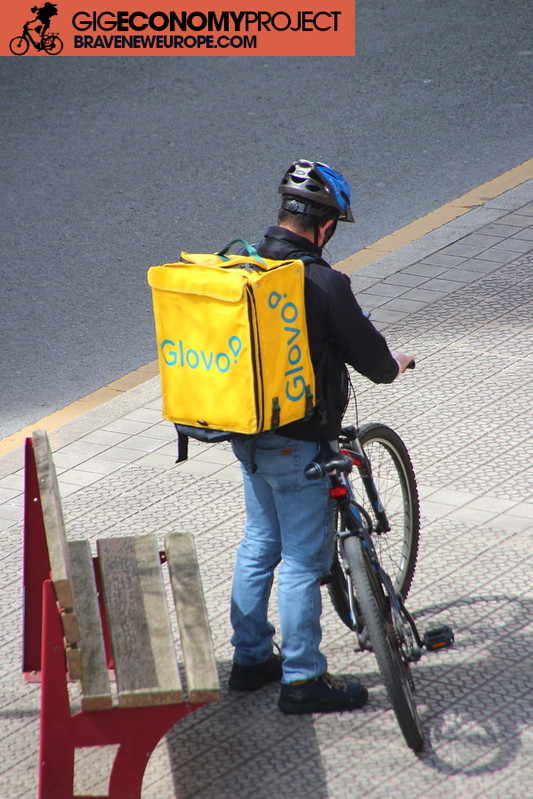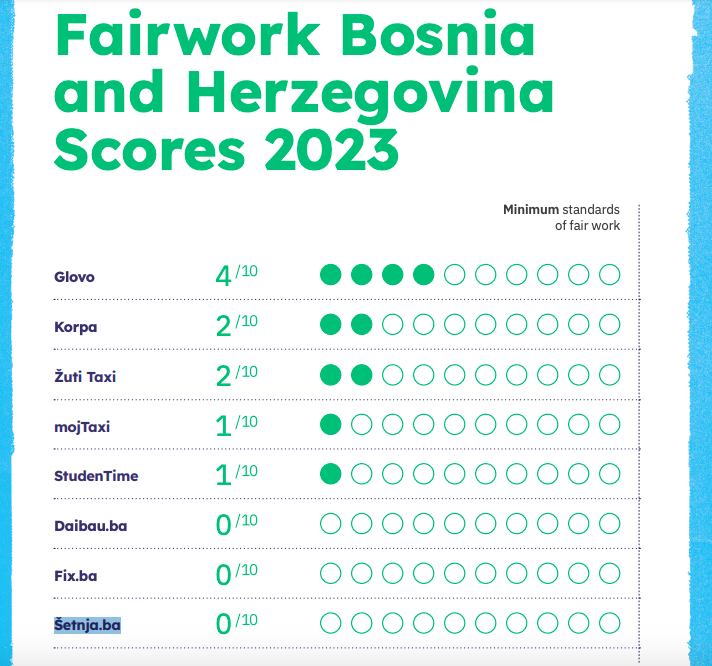The Gig Economy Project speaks to Amela Kurta and Ilma Kurtović, two of the authors’ of the first study of Bosnia and Herzegovina’s platform economy, about the emergence of gig work in the post-Soviet, post-war Balkans’ country.
The Gig Economy Project is a BRAVE NEW EUROPE media network for gig workers in Europe. Click here to find out more and click here to get the weekly newsletter.

Last year was the 30th anniversary of Bosnia and Herzegovina (BiH) becoming an independent state. The country’s devastating war, which killed around one million people and displaced two million more, ended 28 years ago. A generation of Bosnians and Herzegovinians cannot remember the Socialist Federal Republic of Yugoslavia or the war which was part of its break-up, but with a complex peace agreement appearing to be fragile right up to the present day, the country remains deeply entangled in this history, politically especially but economically as well.
BiH’s post-Soviet transition to capitalism was heavily influenced by the neoliberal International Monetary Fund, and as such was marked by widespread privatisation of state industries and liberalisation of the labour market. While BiH’s average annual growth per capita has been stronger than any other former Yugoslavian state (although only at 1.6%), unemployment remains high at 15%, while a huge 30% of the economy is organised informally. How does the gig economy fit into this contemporary picture?
Growth in internet connectivity has been relatively slow, rising from 61% of the adult population having internet access in 2011 to 77% in 2022, still one of the lowest figures in Europe. But like in the rest of the continent, the pandemic led to a sharp rise in the use of food delivery platforms, a sudden change in consumer habits that has continued as Covid-19 has eased.
“Digital literacy was at a low level for a long time, and still is quite low, but when the pandemic started, Glovo bought a domestic platform and started their business here,” Amela Kurta, research assistant at the Centre for Development and Social Science Research (CREDI), tells the Gig Economy Project.
“Many workers lost their jobs in traditional businesses at that time, so the food delivery platforms were an opportunity for them to find a job. Now it has become a normal thing for consumers to use platforms for everyday activities.”
Kurta is a researcher in the Fairwork BiH team, the academic-action project on the platform economy based in 38 countries around the world. On Thursday [7 September], Fairwork published their first Bosnia and Herezegovina platform ratings.

Glovo (owned by German multi-national Delivery Hero) is the only international platform operating in BiH’s food delivery sector, and came out best from the ratings, with a score of four out of 10 for meeting minimum standards of fair work. That’s not saying much though, as the highest rating of the domestic platforms was two out of 10, with three platforms scoring zero.
These low ratings should not come as a surprise, given the fact that platform work remains unrecognised and essentially unregulated in BiH. While labour regulations do exist, they are not being enforced in the context of BiH’s growing platform economy. Consequently, gig work intermeshes with the country’s broader informal economy.
“When you look at the platform economy, you will see different examples of informal work,” Kurta explains. “You will have workers who are not registered at all, which means if the platforms breach their own terms and conditions the worker cannot sue them. You have employees but who are not getting all of the benefits they should, and you also have students and pensioners who do not want to have an official contract because then they would lose their other benefits.
“So platforms are using this informality to gain higher profits, but also many workers want this informality because their income will be higher at the end of the month if their work is conducted through this grey legal area.”
Glovo operates a sub-contracting system in Bosnia and Herzegovina known officially as ‘3PL’, and more colloquially as ‘aggregators’, a system that also exists in neighbouring Croatia. Workers are offered employment contracts (though not all of them take them) and they are paid more than the minimum wage. But, like in Croatia, there are problems of accountability.
“Distributing safety equipment, annual leave, sick leave; all of this is in the contract between the platform and the aggregators, but there is no consistent mechanism for ensuring the aggregators implement this,” Kurta says.
“We asked the platforms to show us what their mechanism is for controlling and monitoring the aggregators, and unfortunately we didn’t find any evidence that this happened.”
Ilma Kurtović, another researcher at CREDI, says that in her interviews with aggregators she found a very informal system, with many of them run by “older platform workers who have been doing it for a couple of years and decided to set up a company”. These workers find “some younger guys, who can choose to sign a contract or not, so it’s not a very good practice.”
For Glovo, which has fought relentlessly against the Spanish Government’s efforts to force it to employ its riders in its home country, choosing to employ riders via sub-contractors, when the legal option is available to hire them on a independent contractor basis, is a curious choice.
READ MORE: Glovo hit with massive €79 million fine for ‘false self-employment’ in Spain
Kurta says that the reason Glovo gave for choosing this model is that it’s complex for a worker to register as self-employed in BiH, but she believes that the sub-contractor model benefits Glovo because they are “deferring part of their operations and part of the responsibility to the aggregators”.
“It’s easier to work with seven aggregators than 450 independent contractors,” she argues.
While BiH shares the aggregators phenomenon in common with Croatia, a significant difference is that whereas the latter has recently had a surge in non-EU migrants brought over by agencies with the express purpose of working for the aggregators in the platform economy, platform work in Bosnia and Herzegovina is still done by native workers.
“We have not come across a migrant worker during our research,” Kurta says. “This may become a trend in the future as now we have a high immigration rate, and we have seen migrants imported from abroad by an agency specifically to work in the construction sector, but so far here that doesn’t include the platform economy.”
In a country where trade unions have been demoralised and discredited in the post-Soviet era, there are no known cases of platform workers joining unions, which are also restricted by law to only recruiting workers who have employment contracts. Also, the short length of time many workers spend in the platform economy has put unions off seeking to organise them.
“Many of the workers we interviewed told us ‘this is the first time I have spoken to anyone about my working conditions’,” Kurta says.
However, platform workers themselves have recently organised successful protests and strikes due to the surge in the price of fuel in the inflation crisis, leading to them demanding and winning higher pay. This demonstrates that a lack of unionisation is not necessarily a block on class struggle.
With the platform economy still in its infancy, Bosnia and Herzegovina’s complex politics – a communitarian system akin to Northern Ireland, but also with a significant institutional role for the EU and United States – does not appear to be interested as of yet in seeking to regulate gig work, nor to ensure that existing labour laws are enforced.
However, Kurta is hopeful that their Fairwork study can help generate a serious debate about the need for this. Moreover, she believes that when the EU Platform Work Directive is finally passed, BiH – which has EU candidate status – “will be forced to at least recognise this type of work, in order to align to some extent our policies with EU policies”.
Thanks to many generous donors BRAVE NEW EUROPE will be able to continue its work for the rest of 2023 in a reduced form. What we need is a long term solution. So please consider making a monthly recurring donation. It need not be a vast amount as it accumulates in the course of the year. To donate please go HERE.


Be the first to comment